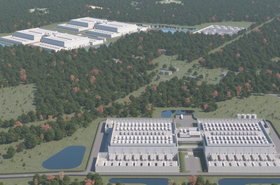
Galaxy Digital goes public on the Nasdaq
Crypto-turned-colo firm Galaxy Digital has listed on the Nasdaq stock exchange.
The company is dual-listed as of May 16, keeping its original listing on the Toronto Stock Exchange (TSE). Despite being based in New York, its public debut was made on the TSE in 2020 because its crypto-centric business unsettled American regulators.
Its share price on Nasdaq opened at $23.50.
CEO Mike Novogratz said during the company’s recent Q1 earnings call that the listing was pursued primarily because the US has “the deepest capital market in the world,” saying that the company’s growth had previously been driven by insufficient investing or trading profits, which had capped its growth.
Greater access to retail trading platforms, inclusion in market indices, and greater visibility were also cited as reasons.
Novogratz also told CNBC that the listing, which he described as “un-American, unfair [and] infuriating,” had taken four years and cost more than $25 million. It should be noted that the company had made its first filing in 2021 before the release of ChatGPT.
He cited Donald Trump’s election victory as a turning point, saying that “the flip got switched… the old regime knew the new regime was coming, and so they started to be much more supportive.”
Proof of the President’s friendliness towards crypto is abundant: since his inauguration, Trump has signed an order calling for the creation of a strategic crypto reserve, pardoned former executives of crypto exchange BitMEX, who had been convicted of violating the Banking Secrecy Act, and relaxed enforcement in the sector. Concerns about potential conflict of interest, particularly regarding his eldest son’s Bitcoin mining business, have arisen.
Ahead of its listing, Galaxy also settled a case with the New York attorney general over its promotion of Luna, a failed cryptocurrency, for $200m.
The company’s hunt for capital markets occurs as it looks to pivot its data centers away from cryptomining to AI workloads.
It was revealed in November 2024 that its flagship cryptomining data center, Helios in West Texas, would be optimized for AI workloads. AI cloud firm CoreWeave is set to occupy 393MW of capacity in the facility.
However, CFO Tony Paquette stated that the company does not expect to “generate revenue from [the data center segment] until sometime early in 2026.”
CIO Chris Ferraro also said that 1.7GW worth of projects were currently under study, with the average size of a potential facility varying from 100MW to 500MW.
Galaxy joins the ranks of crypto firms like Core Scientific, Hive Digital Technologies, and Northern Data, which have also pivoted into the data center business. While firms like Galaxy have maintained a hybrid model, some others, like CoreWeave, have abandoned their crypto roots in response to the AI boom.






